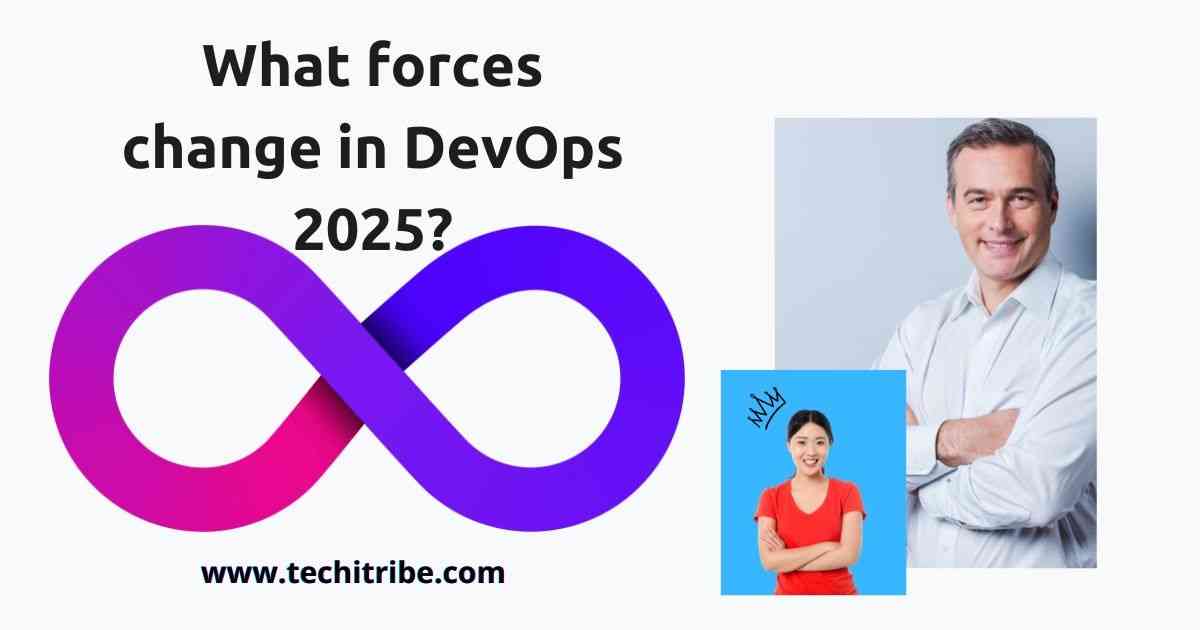DevOps 2025: A must-know for every developer to be at the correct end of the curve in this world of tech evolution at warp speed. Tech, by nature, is dynamic-and one who doesn’t adjust to change becomes dead weight in this regard. DevOps is a methodology which changed the definition of how people develop, test, and deploy software; therefore, it defines importance as we go into the world of 2025.
DevOps 2025, Such an awareness of new trends and challenges along with useful skills has been a reason why the developers have been up at the pinnacle of the ever-changing landscape of DevOps. This guide, with actionable insights and practical examples, will put you ahead in the technology globe.
Also Visit On This Link: Breaking Down IT Trends: The Future of Information Technology in 2024

What forces change in DevOps 2025?
DevOps 2025, What is the heart of the revolution DevOps is technological improvement, with an increasing demand for higher speed as well as high reliability in the delivery of software. The main influential forces toward these directions in 2025 are as follows:
1. Automation: This forms the heart of a modern DevOps
Indeed, DevOps something that would always have been kept in the center of automation, but the year 2025 will not be just some suggestion but the reason for every successful strategy in DevOps. In this line of the automation process, the organizations will always tend to limit down on errors, maximize efficiency, and quicken up the lifecycle of the software development.
Example: Companies Netflix and Spotify completely automated their pipelines of CI/CD thus thousands of releases pass without any human interference on any given day.
2. DevOps and AI and Machine Learning
AI and Machine Learning -Two Technologies Redefining DevOps
DevOps 2025, These technologies scan humongous amounts of data to predict system failures, optimize resource usage, and even make decisions on their own.
Insight Tool: Harness and Dynatrace among others, is harnessing AI to bring anomalies in application performance to the fore before they actually impact the users.
Some Key Trends that help us understand the DevOps in the Year 2025. Here is the major thread of what one should keep an eye on:
1. GitOps Revolutionizes Infrastructure Management
DevOps 2025, GitOps is essentially the methodology tracing each and every change in the infrastructure and applications back to the source of truth in a git repository. It eliminates all the complexities associated with deployments and even allows traceability and delivers consistency in all place-operations.
The Why: GitOps lets developers own and operate infrastructure with the same tools and processes they know and love when running code and doing so enables more coherent workflows.
2. Shift Left Security Takes Center Stage
DevOps 2025, This changed security no longer as an afterthought but instead shifted left and integrated security at the earliest point possible in the development lifecycle, that has amplified prevention of threats and compliance across the industries.
Practice Advice: Tools such as Snyk and Checkmarks help in facilitating security testing to be incorporated into CI/CD pipelines.
3. Multi-Cloud and Hybrid Cloud Strategies
DevOps 2025, Huge flexibility is there in cloud computing. It lets one avoid lock-in situations and hence makes it ready and capable of deploying applications across many different environments using strategies such as multi-cloud and hybrid clouds.
Pro Tip: Mastery of Kubernetes along with the usage of something like Helm Charts while handling complex cloud setups having containerized applications.
4. DevSecOps- The New Requirement
DevSecOps : Injecting security at every stage of the DevOps pipeline. Or to put it in better words, safest practice of growth of cyber threats-only by bringing security directly into the build process and containers. Developers will need to take a security-first approach with security measures .
Tooling Requirements
HashiCorp Vault, for secret management; Aqua Security, container protection .

How DevOps Is Changing Roles for Developers
Along with changes in maturity in the adoption of DevOps, there arises changes in the roles and responsibilities of the developers to make the environment even more integrated and collaborated.
1. Developers as Team Players
DevOps 2025, Although the separators of development and operations no longer form an argument, by 2025, developers collaborate with operations, security, and business stakeholders as well to make sure that the technical goals are aligned with the priorities of the organization .
Takeaway: It has nothing to do with tools; collaboration is a culture that lives in shared responsibility and opens up channels of communication .
2. Developer-Tester
Boundary is becoming increasingly blurred: with an increasing number of developers having to write and run test cases for code quality the moment it hits production.
Pragmatic Tip: Familiarize yourself with Selenium and Cypress testing frameworks. This will add that extra cap in your testing skills.
Developer skills essential to 2025
Agility in the DevOps market requires flexibility. Hot skills for 2025 will be:
1. Infrastructure as Code (IaC).
IaC lets developers treat infrastructure as code so that they might manage or create programmatically to address consistency and scalability purposes. Must-haves in this domain are Terraform and AWS CloudFormation .
Case study: Amazon is making heavy use of IaC to scale up its worldwide infrastructure, to make fast moves at low cost, and to optimize.
2. Observability: Beyond Monitoring
DevOps 2025, Monitoring will soon penetrate whether one can make observability or insight into the working of a system and its users actionable. That is, of course, one of the most important skills concerning the debugging of complex distributed systems.
Focus Area: Learn to use tools like Prometheus, Grafana, ELK Stack for monitoring and observability.
3. Improved Security Practices
DevOps 2025, It becomes everybody’s prerogative instead of something which the security team has managed by 2025. Developers will also be expected to learn the best practices for secure coding, vulnerability scanning, and threat modeling.
Action Step: Take courses on ethical hacking and DevSecOps for even better security skills.
DevOps Trouble Shooters over Adoption Challenges
Applications of DevOps are not problem-free. Here is how the developers can counter some of the common problems:
1. Fear of Change
DevOps 2025, It is extremely challenging to enforce traditional work within DevOps. Developers have to seek incremental deployment and prove the worth of DevOps to the stakeholders.
Tip: Introduce the concept of DevOps in small pilot projects then take proofs for the presentation.
2. Too many tools
Sometimes, there are too many tools in DevOps. It results in paralysis by analysis that leads to paralysis by not choosing to use any tools. Master a few flexible tools that will work for your organization.
Tools to Use: Git, Jenkins, Docker, Kubernetes, and Ansible.
3. Measure Success
For example, KPIs are defined only where measurement is possible against initiatives by DevOps. Suppose the considerations applicable to deployment frequency and lead time for changes, the mean time for developers to recover.
Pro Tip: Plot these metrics on dashboards and track improvements over time

Emerging Technologies Defining DevOps in 2025
In the not too far away future, many of the emerging technologies will change the way DevOps is defined. The following is going to make it to that list:
1. Serverless Architectures
Abstracting the entire management of infrastructure, one could worry less about the problems of infrastructure and can immediately start writing code in serverless computing. This would turn out to be a great window of opportunity for most of the organizations to move on towards the direction of efficiency.
Notable Tools: Lambda (AWS), Cloud Functions (Google), and Azure Functions.
2. Edge Computing
The devices in the IoT process edge computing on more data nearer to where it originates. The result is much lower latency and better performance in distributed systems.
Key Takeaway
Developers will have to be highly sophisticated in orchestration at the edge, using tools like Open Horizon or AWS Greengrass.
3. AI-Based Development Pipeline Pipeline
AI is revolutionizing CI/CD pipelines as it automates all mundane work and analytics that are pre-predictive to avoid any errors and speed the deployment.
Preparing for the Future of DevOps
It has to mature in terms of developing a culture of continuous learning and experimentation to outsmart this competitive world of DevOps. And the following action steps have been put forth by the author:
1. Invest in Certifications
Skills can be claimed through certifications and then distinctly differentiate you. Don’t miss out on AWS Certified DevOps Engineer, Kubernetes Administrator, and Azure DevOps Expert.
2. Open source contribution towards various projects
Open source contribution is the most efficient way to get hands-on experience and learn from the community.
3. Interaction with the DevOps Community
By attending forums, webinars, and conferences that have new trends and new technologies.
Resources: Subscribe to communities through channels such as GitHub, Reddit, and LinkedIn.
Conclusion
By 2025, DevOps is no longer any methodology or culture; it is both represents collaboration, innovative thinking, and continuous improvement. While embracing security-mindedness and inclusion of automation, getting the latest tools in this complicated area, developers may win out.
It’s really cool, but it’s for people who are ready to learn it and push into the future of DevOps. And you, do you want to lead this fabulous technological revolution?

👍